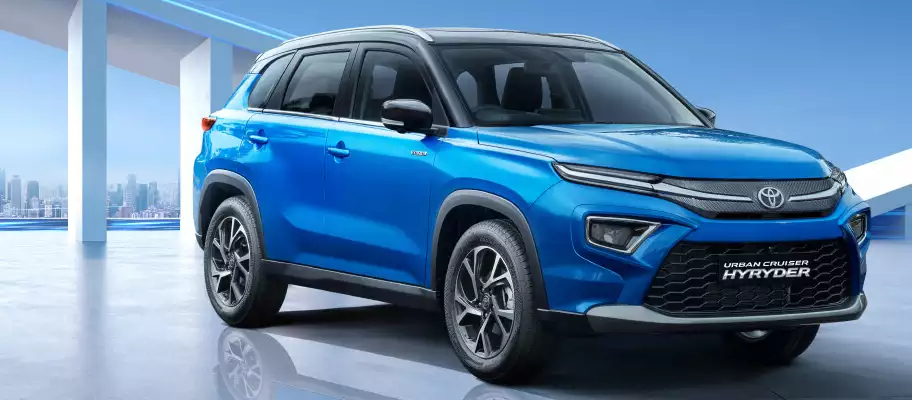Is Suzuki collaboration strengthening or diluting the Toyota brand in India?

The partnership between Toyota and Maruti Suzuki is seen as mutually beneficial, but critics argue it could dilute Toyota's brand identity. Rebadged models like the Toyota Glanza, Urban Cruiser Hyryder, and Taisor, based on Maruti’s Baleno, Grand Vitara, and Fronx, may lack the premium feel that Toyota loyalists expect, raising concerns about the long-term impact on its brand image.
Just Another Brand
“Toyota needs to invest strongly in the realm of communicating its edge. The brand is today diffused, and plays the "also running in the space" game. This needs to change. The brand needs to invest in a very strong brand positioning stance for the Indian market. The Indian auto market is exceedingly sharp today. Being ahead of the game means occupying one strong high-ground. That high-ground needs to be invented by Toyota for itself,” says Harish Bijoor, Business & Brand-strategy specialist & Founder, Harish Bijoor Consults Inc.

Bijoor adds, “The innovation story needs to be deepened by offerings right at the top of the pyramid that offer special appeal. In the old days, the auto consumer was all about basic needs at the bottom of the pyramid, superior wants and desires at the middle end and special brand aspirations at the top end. Today, you need to add yet another category. This is the category of consumer fantasy. This spans across segments. Toyota needs to investigate and open this space for itself. The brand needs to invest in specific research within the Indian context and customise. The future of the auto market will be defined by what happens in India. Toyota needs to become one thought in the minds of Indians. It is still not that. It needs to dominate and champion one space of specialty.”

Umesh Bopche, CEO, Experience Commerce & CYLNDR India, says, “Toyota has long established itself as an aspirational brand, known for its high quality, innovation, and premium offerings like the Fortuner and Innova—benchmark vehicles in their segments. However, this perception has been diluted following the collaboration with Maruti Suzuki, which is recognised for its affordability in India rather than being an aspirational brand. This partnership has led to a dilution of Toyota’s unique identity, as rebadged vehicles now lack a distinctive value proposition. As a result, consumers are gravitating towards brands that offer more unique features and a clear emphasis on individuality and innovation."
Consumers Speak
Inderjit Singh Sokhi, a Maruti Suzuki SX4 owner and car enthusiast from Mumbai, highlights the confusion caused by the collaboration between TKM and Maruti Suzuki. “Toyota has long been known for its reliable, high-value cars, like the Innova Crysta, which became status symbols despite lacking fancy features. But today, consumers are more focused on tech features, even if it means higher maintenance costs and poor mileage,” he says.
Sukhi believes Toyota's technology edge, as seen in innovations like the Prius, is underutilised. “The Prius was ahead of its time, and Toyota has always been strong in technology. To protect its premium image, Toyota should consider introducing cars under a sub-brand, similar to Maruti Suzuki’s Nexa, to distinguish its high-end models. For example, the Maruti Suzuki Grand Vitara is performing better than Toyota's Urban Cruiser Hyryder, and Toyota should focus on maintaining clear differentiation to prevent brand dilution.”
Advocate Arjit Sharma, another car enthusiast and owner of Mahindra Thar from Delhi, “When I recently sought to purchase a new Toyota, I found myself confronted with these rebranded (rebadged) options, which, in my view, lacked the quality that Toyota was once known for. It felt disheartening to see the brand I admired aligning so closely with Maruti Suzuki, compromising the very essence of what made Toyota special. Ultimately, I chose to invest in a Mahindra Thar—a vehicle that stands out as unique and adventurous, fitting my desire for something distinctive within my budget.”
Sharma adds, “As a lifelong fan of Toyota, I vividly remember the excitement surrounding the launch of the Innova. Having admired the Qualis, the Innova represented a significant leap in comfort and reliability, quickly becoming a favourite among consumers. However, as time has passed, I've noticed a shift in Toyota's offerings that has left me disappointed. I hope Toyota reclaims its legacy and offer vehicles that truly reflect the quality and reliability that once defined it.”
However, Tejas Mehta, a new Toyota Glanza owner from Mumbai, has a different standpoint. "The main reason I chose a Toyota car was the trust in their service and quality. With Toyota, there’s no hassle of constant follow-ups with the dealer, and the service is world-class. In my experience, the Glanza feels much more stable than the Baleno. I firmly believe that Toyota will always stand for trust, innovation, and quality, regardless of its partnerships. They would never compromise on these values."
Steady Growth

Pointing on the strengths that the collaboration with Suzuki brings to Toyota in India, Ammar Master, Director (South Asia), Automotive, GlobalData, says, “Toyota's global partnership with Suzuki is a calculated move that has been particularly advantageous in the Indian market. This collaboration has allowed Toyota to tap into Maruti Suzuki's extensive knowledge and experience in developing smaller sized vehicles. By leveraging this partnership, Toyota has been able to align its product offerings more closely with the local market demands.”
Additionally, “the strategy of rebadging Maruti Suzuki products has enabled Toyota to expand its portfolio with remarkable efficiency. This initiative has allowed Toyota to introduce new models into the market at a significantly reduced cost and within a shorter timeframe than would be required for independent development. Consequently, Toyota has been able to offer vehicles at price points that resonate with a larger customer base.”
Master further adds, “Toyota's strategic initiatives in the Indian market, including its partnership with Suzuki, the introduction of THS (Toyota’s Hybrid System) technology, and the planned launch of BEV (Battery Electric Vehicle) models, demonstrate a long-term vision. The company is not merely adapting to current market trends but is also preparing for the future. Toyota's dedication to remaining at the forefront of technology and innovation is likely to solidify its market position and drive growth in the coming years.”
When contacted TKM denied to participate in the story. Today, around 46% of TKM sales come from Maruti Suzuki rebadged models. As per the SIAM data, TKM held a market share of 6% in India (domestic sales) in FY24.

Agrees, VG Ramakrishnan, Managing Partner, Avanteum Advisors LLP, "Toyota is working to change the playing field by focusing on building a sustainable environment alongside increasing sales. They've made strides in this approach, particularly in Uttar Pradesh and now Karnataka, where their strategy revolves around making hybrids more affordable with the support of government policies. Instead of investing heavily in branding, Toyota is channeling resources into reshaping the market to leverage their strengths for a better competitive position."
Ramakrishnan further notes that while Toyota was seen as an aspirational brand in the early 2000s, the automotive market has evolved significantly, and continuing to view the brand through a traditional lens doesn't reflect its current approach in India. "As the context changes, so should the metrics for evaluation. Toyota loyalists might feel dissatisfied with this shift, but there’s a new wave of consumers entering in the market who align with the brand's evolving focus on innovation and sustainability."
Replacing “wow” factor with “disruption”
Toyota is no longer chasing "uniqueness" in the traditional sense but instead, is laying the groundwork for what will be a key differentiator in the future—green, tech-forward mobility. By prioritising technology, it is looking beyond the immediate competition and sales battles, positioning itself for long-term success in India's evolving automotive landscape. This approach is already causing ripples in the market with competitors feeling the heat. In essence, Toyota is playing the long game, and while it might not have the "wow" factor right now in terms of aspirational branding in India, its strategy could lead to significant market disruption in the near future—much to the concern of its peers.

